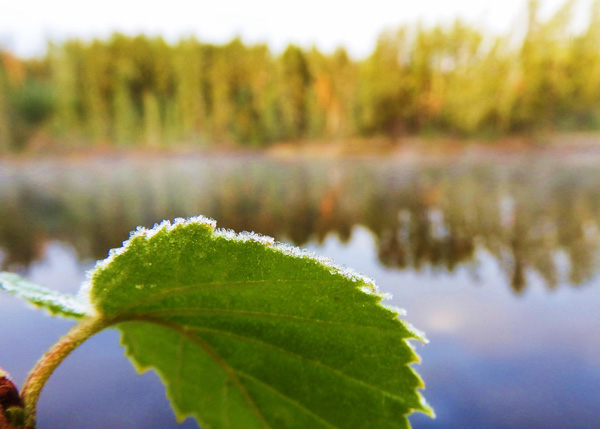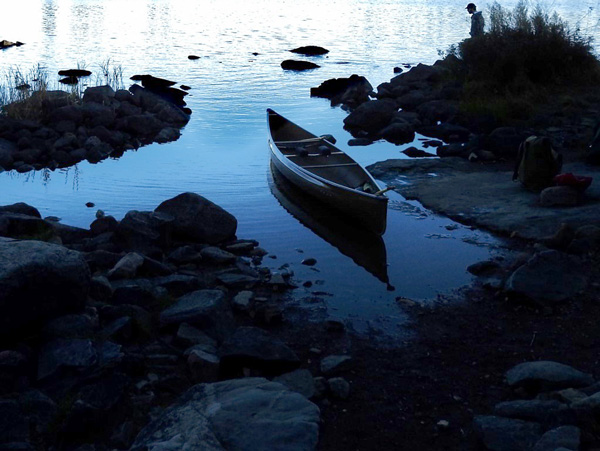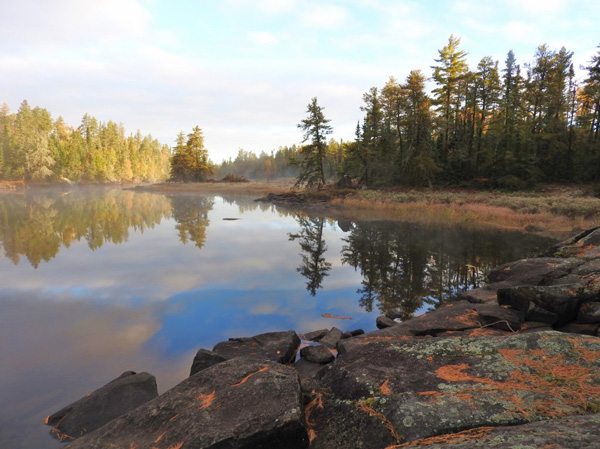News & Articles
Browse all content by date.



A fleeting sunset flamed through a ragged stand of jack pines across the bay. Patchy clouds provided just enough substrate to catch the color, and the faint breeze barely ruffled their reflection on the lake. A biting chill in the air confirmed a more challenging forecast ahead. Here, on a classic, rock knob campsite in the Boundary Waters, we perched above a scene of rugged beauty.
A small campfire, composed mostly of jack pine twigs laden with tightly closed cones, crackled softly against the descending dusk as I pulled a book out of my portage pack. For this trip, I’d chosen Open Horizons, Sigurd Olson’s autobiography, which is filled with just as many lyrical scenes and philosophical meanderings as his other books.
I read the first lines aloud. “The Pipes of Pan sound early before the sense of wonder is dulled, while the world is wet with dew and still fresh as the morning.” And before I could begin the next sentence, a sweet, tooting call floated across the bay. The first time I heard the regular, almost mechanical, song of a saw-whet owl, I thought it was a car alarm or back-up beep. I learned my lesson quickly, though, and now perk up my ears on the rare occasion of this simple serenade.
Saw-whets are tiny owls, only as big as a robin, who are nonetheless tough as nails. They breed in the boreal forests of southern Canada, and the conifer forests of the northern and western United States. They are variably migratory, with some owls overwintering in their breeding territories, and others, especially from the far north, heading south. Their peak migration tends to coincide with leaf-off. This guy was right on time.
The owl ceased tooting after less than a minute, but before I could return to Sigurd, another sound cut through the dusk. This time it was the messy pattering of ducks taking off, and then the breathy whistling of wind through wings as a small flock of goldeneyes relocated out of our bay. Their distinctive flight sound has earned these compact, black-and-white ducks the nickname “whistlers.”
These interruptions to Sigurd’s musings on the Pipes of Pan seemed appropriate, since Pan and his pipes represent the harmonies of nature itself. In mythology, Pan is the half-goat Greek god of the earth who makes music with a set of reeds. “What I heard there were the Pipes,” wrote Olson, “and what I sensed, I know now, was the result of a million years of listening and being aware...”
This late fall trip was one of the quietest I’ve experienced in the Boundary Waters. Few other hardy souls braved the cold snap. Many birds had either migrated or fallen silent. The sounds we did hear, though, seemed more significant in their isolation.
At about 10:30 p.m., the quiet gave way to the patter of rain on nylon. Just before dawn, the sound changed distinctly to the harsh chatter of sleet, and then the soft swish of snow. Snow! The precipitation continued off-and-on all day. Happily, we were traveling with the wind, so the sleet simply hissed against our rain jacket hoods instead of stinging at our red cheeks. Neoprene gloves helped, but did not completely warm our hands. Portage landings were awkward, given the strong incentive to keep our feet dry. This is what outdoor adventurers often call “Type 2 Fun,” defined by The Mountain Training School as “not particularly enjoyable at the time, but rewarding after the fact.”
Although, there was something about the challenge—and certainly the swing of a paddle and the balance of a canoe—that was pleasurable in the moment, even against the cold. Sigurd Olson experienced pleasure in the face of discomfort, too, writing: “but for a moment the Pipes had sounded above the crashing of the waves…”
The weather did improve a little by our final day, and we enjoyed a calm, sunny afternoon listening to the clear whistles of a couple of gray jays, the chirping of an eagle, and the low, wild roar of a rapids in the narrows. That peaceful afternoon faded into one of the quietest nights I’ve ever spent in a tent, followed by a crisp dawn with every leaf edged in lacy frost.
The lake steamed silently as we made breakfast, and a flock of geese chattered amicably in the distance—their conversation slowly drifting southward. Not in a hurry to end our trip, we sat idly watching the mists swirl, our empty oatmeal bowls forgotten. In the absolute calm, I began to notice an occasional soft rustling sound. All around our campsite, birch leaves were detaching one-by-one and drifting to the ground. Not a whisper of breeze disturbed them, but perhaps the weight of the white rim of frost was enough to break them free.
“…and the Pipes were playing softly as they always do when a man has listened to their music and followed it to its source.”
Special Note: Emily’s book, Natural Connections: Exploring Northwoods Nature through Science and Your Senses is here! Order your copy at http://cablemuseum.org/natural-connections-book/.
For over 45 years, the Cable Natural History Museum has served to connect you to the Northwoods. Come visit us in Cable, WI! Our new phenology exhibit: “Nature’s Calendar: Signs of the Seasons” is now open.
| Tweet |


